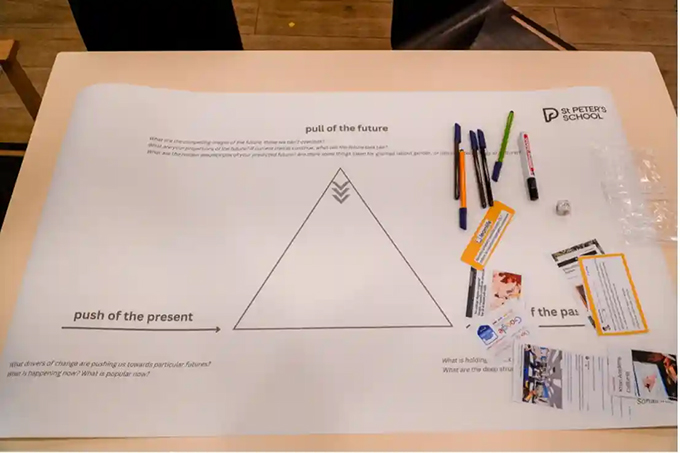
In a world marked by climate, social and technological crises, preparing younger generations to navigate uncertainty has become a necessity. Very early on, they are invited to take concrete actions, anchored in their daily lives, which are embodied, in particular, in the adoption of simple gestures in favor of the environment : sorting waste, consuming local products or saving energy.
Yet do these practices really enable children to think proactively about the future?
Defined by UNESCO as the ability to understand, anticipate and shape possible futures, futures literacy offers an alternative. It does not only consist of considering developments and organizing how to support them, but also of thinking about them critically and creatively, taking into account the complexity of situations.
By engaging individuals to explore future scenarios and adapt to social, environmental and technological changes, it fosters resilience and initiative.
Beyond short-termism
While they are concerned about the planet, children lack the resources to consider alternatives to the looming crises. For example, in a study conducted with 42 children aged 6 to 11 , we found that only one child represented, in her drawing, the “good” behaviors to adopt while the others simply reproduced the causes (for example, industrial pollution) and consequences (disappearance of polar bears) of climate change that they had identified.
Futures literacy could help them move beyond this short-termism and understand that their current actions influence their future, improving their ability to envision sustainable trajectories.
On the other hand, awareness of ecological crises can generate paralyzing anxiety. By developing varied scenarios and exploring desirable possibilities, children learn to transform their anxiety into constructive action. These approaches also aim to strengthen their sense of self-efficacy and legitimize their ability to act.
Futures literacy education encourages children to engage in public debates and contribute to innovative sustainable development strategies, going beyond awareness-raising to protecting the planet. They are no longer just consumers of solutions but creators of the future.
Indeed, futures literacy is not limited to the acquisition of technical knowledge or know-how. It is a way of thinking about the world, a state of mind that cultivates curiosity, creativity and responsibility. It prepares children to become engaged citizens, capable of providing innovative and inclusive responses to global crises.
Participatory methodologies
It is difficult for children to reason about abstract concepts. This is why the use of age-appropriate tools, such as fictional stories, games, drawing or simulations, is necessary to stimulate their imagination. Our research project, currently in development, is moving in this direction, by inviting children aged 6 to 11 to imagine sustainable food systems, encouraging them to consume more vegetables and legumes.
Furthermore, to stimulate their divergent thinking and encourage original proposals, children need to think based on objects and situations that they know or products that they consume. Based on a prospective approach through design, a study conducted in England in 2019 sought to make children understand the threats to bees and the environmental consequences of their disappearance. They designed an artificial honey dispenser, transposing their reference of a welcoming place, materialized, for them, by a hotel.
Finally, it is about integrating innovative educational approaches . Academic work relayed by field actors, such as Teach the Future, Futur en Herbe or Eutopique, show how to implement futures literacy in school programs or associative activities. These approaches are based on participatory methodologies taking the form of debates, workshops for co-designing solutions, role-playing games, etc. Supervised by adults trained in foresight, children thus become actors in their learning.
Futures literacy does not seek to predict the future, but to provide the means to imagine it, influence it and respond to it with resilience. Integrating this skill into our teaching practices is a way to train enlightened actors, ready to meet the challenges of a constantly changing world.
Author Bios: Pascale Ezan is a University Professor – consumer behavior – food – social networks at the University of Le Havre Normandy and Julie Ezan-Zecca is a PhD student in Management Sciences, Strategic Foresight & Innovation at Paris Dauphine University – PSL
